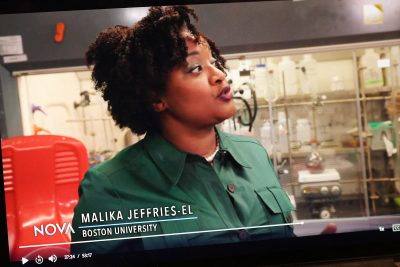“Big-picture” perspectives can at times seem overwhelming, but zooming in on the details can produce just the same mystery.

The new NOVA docuseries titled “Beyond the Elements” — a three-part series closely examining the chemical bonds that make up the world around us — premiered on PBS Feb. 3.
NOVA — a reference to the astrological event in which a star suddenly explodes and casts a bright light — has produced science documentaries for PBS since 1974, each investigating a different topic in an in-depth, entertaining and accessible format.
David Pogue, a technology and science writer and five-time Emmy Award-winner, hosts the series.
Pogue travels across the globe talking with scientists, engineers and other industry experts for the series to learn how the products and materials that surround us are manufactured from the molecular level.
Malika Jeffries-EL is the associate dean of the Graduate School of Arts and Sciences and associate professor in chemistry and materials science at Boston University. She was featured in “Indestructible,” the second installment of the new NOVA series, which focused on how the chemistry of molecules is manipulated to create nearly unbreakable everyday objects.
Jeffries-EL’s research focuses on polymer chemistry — more specifically, creating “semiconductors,” or organic materials capable of conducting electric charges.
“Our systems are what we would classify as organic semiconductors,” Jeffries-EL said in an interview, “whereas most polymers are insulators in that current charges [do] not transport through them.”
In the PBS episode, Jeffries-EL discussed the molecular chemistry of different kinds of household plastics and how the same material can create two distinctly different products, depending on how the plastics are processed and molecules are combined.
She also gave live demonstrations on how to manufacture certain types of plastics through various chemical combinations, such as making polyurethane foam, used for seat cushions and insulation — which she and Pogue formed into a make-shift foam snowman.
As lighthearted as the demonstrations were, Jeffries-EL said in an interview these experiments are not an everyday occurrence in her lab, where she and other researchers look for more efficient semiconductors from carbon-based material such as plastics to be used for electronics, including television and computer screens.
She said her research is concentrated in two main thrusts based on the unique property of a semiconductor.
“The two main things we’re looking at is whether we can harvest solar energy using our systems, and then convert it into usable electricity,” Jeffries-EL said in an interview, “or whether we can make light-emitting materials by pumping electricity into them and getting light emission to come out of the system.”
This NOVA episode not only was a notable experience for Jeffries-EL, but it also marks her first network television appearance, she said.
“It was super fun,” she said. “I didn’t have an appreciation for the magnitude of it when I was doing it and then when they released it was like ‘OK.’”
Jeffries-EL said she additionally consulted as a scientist on the project — producers told her they wanted to “tell a story about a molecule,” and she could not have been more excited to share that story in a fun and educating way.
“Plastics came up as a hot topic,” Jeffries-EL said. “It was up to me to figure out the science, to bring the science to life. So, I’m really proud of the outcome.”
The docuseries also focused on how single-use plastics — which compose half of the plastics produced — can perpetuate pollution and global warming. Jeffries-EL said her research aims to use plastics as a way to save energy.
“Our biggest contribution to the enterprise is going to be in the space of energy,” Jeffries-EL said in an interview, “and we are literally trying to make materials that harvest energy.”
Jeffries-EL runs her self-named research group in BU’s graduate chemistry program, conducting research on semiconductors with graduate students. Those working on the team alongside her had some positive words about their leader.
Aidan Murphy, a graduate student at BU and member of the research group who focuses on creating semiconducting small molecules, said Jeffries-EL is a great scientist and head researcher.
“Dr. Jeffries-EL is absolutely phenomenal as a boss,” Murphy said in an interview. “While she’s super busy with her job as dean, she still always has time to meet with us about research every week.”
De’Zhanae McCall-Butler is another graduate student in the Jeffries-EL Research Group focusing on organic light-emitting diodes and organic photovoltaic devices to synthesize materials for organic solar cells. She said she looks to Jeffries-EL as a role model.
“I really look up to her,” McCall-Butler said. “Being a Black female, she’s already gone through what I eventually have to go through and [she’s] just a good person to talk to and give you good advice on how to move forward.”

















































































































